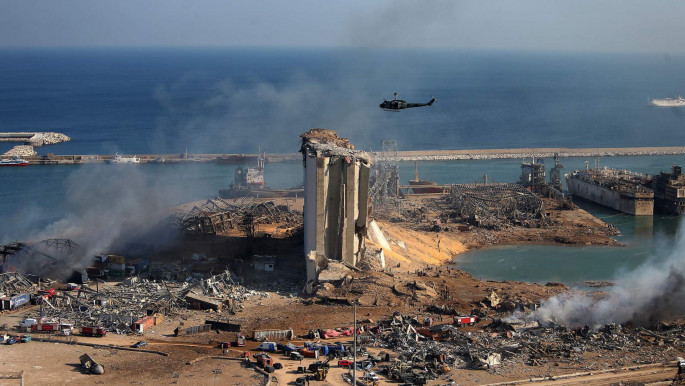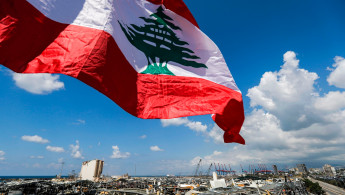Between tragedy and hope: Survivor's guilt in the Arab diaspora
Whenever a disastrous event takes place, then, such as the explosion in Beirut last week, those of us in the diaspora grapple with feelings of helplessness and guilt.
Sadly, due to the longstanding impact of colonialism and corrupt governments, among other things, the region – as beautiful as it is – has long been rife with turmoil, and reduced time and again to news headlines.
But for those of us in the diaspora, these tragedies are much more than just a disaster striking in some far-away country that we are able to distance ourselves from, in the mistaken belief that it could never happen to us.
These are very real, very personal events that affect our friends and our family members, our brothers and sisters; our fellow human beings.
In truth, part of the reason there is such a large Arab diaspora is because either we or our parents moved away from our home countries, either out of necessity, or in the hope of greater opportunities. But that doesn't mean any of us are able to – or wish to – separate ourselves from what happens in our respective homelands and in the region at large.
 |
We are often faced with an overwhelming survivor's guilt in the face of these tragedies, feelings that arise from even having the privilege to process these emotions from afar |  |
Indeed, that we even have the means and the resources to seek out this so-called "better life" contributes to these feelings of guilt. What makes us more worthy of life and stability and freedom of speech and a good, better, best life?
| Instagram Post |
We are often faced with an overwhelming survivor's guilt in the face of these tragedies, a pervasive sense of disempowerment and feelings of guilt that arise from even having the privilege to process these emotions from afar.
As filmmaker Ziad Haggag told The New Arab: "My heart is aching seeing lots of my friends losing their houses, their friends and their families. I feel guilty for not being there to help my loved ones. Lebanon has always been there for me when it comes to my career, friendships and love, and I was not there for Lebanon."
With these feelings too comes a disillusioning realisation. As an excerpt of an Instagram post by Mireille Nasr reads: "When you're Lebanese and a first-generation American, you're never really American. Your food is Lebanese. Your language and your math and your manners are Lebanese… Your curse words are Arabic, as are your prayers, because some things just don't have the same feeling in English. When you grow up Lebanese in America, you're never really American…
"Until you are," she continues. "Until you're watching your capital explode on your fully charged smartphone. Until you're scrolling through the Instagram posts, laying in bed after a hot shower. Until you're listening to the news on the way to the job you still get to go to… It's hard to explain this feeling. The feeling of being too whole to be broken..."
Being an Arab living in the West especially (or even just online), it can be disheartening to witness the way in which many non-Arabs appear to be desensitised to such events in the region.
As law professor Khaled Beydoun put it in a Tweet: "If the #Beirut blasts happened in Europe or North America, the outpour of support would be immense, overwhelming and ongoing. Not all tragedies are the same. And location, sadly, determines the scale of global sympathy and response."
In truth, as many are noting, the world quickly donated over one billion dollars when Notre Dame cathedral caught fire. Why are we all #JeSuisCharlie for France, but not for the country they colonised? It's an ugly truth, and many in the diaspora often fall into trying to humanise their homelands by proving their beauty, worth, or similarity to 'Western' countries in order to foster empathy. This is in itself a dehumanising practice.
 |
My heart is aching seeing lots of my friends losing their houses, their friends and their families. I feel guilty for not being there to help my loved ones |  |
Abetting further distance and contributing to these feelings of helplessness and guilt is the realisation that, as part of the diaspora, the plight of those on the ground is not our plight to appropriate. That empathy is not the same as lived experience or understanding. But that's not to say that we can't still contribute to the causes in our homelands or stand and raise our voices in solidarity.
 |
|
| Beirut Explosion: Be angry, not just sad, for Lebanon |
Indeed, over the past week, many in the diaspora have created crowdfunding websites and put together lists of organisations where people can donate. Millions of dollars have thus far been raised and hundreds of people in cities including Paris, Sydney and Brussels have held rallies and waved Lebanese flags in support of the demands of the people on the ground.
From educating ourselves on the systemic issues in place, donating, raising our voices and calling on our respective governments, there is a lot the diaspora can – and are – doing in the face of this most recent disaster.
Raising awareness outside of our echo chambers and ensuring the eyes of the world are on Beirut is particularly important in ensuring that those responsible are held accountable, and that change is swift and long-standing.
This is a sentiment echoed by Elissa Freiha, the Lebanese-born founder of WOMENA, who told The New Arab that while she feels "distant and useless" she's found some glimmer of comfort in using her platform to raise awareness and provide context to a predominantly international audience. This, she explains, helps indirectly as it contributes to garnering donations and further spreading the word.
Indeed, while the local struggle is always the essence of a movement, those abroad can complement and build on that. There is strength in unity and collectivity, and these are things that the diaspora can serve to amplify. Maybe our feelings of guilt and helplessness are essential in ensuring we tap all the way into that.
Alya Mooro is an Egyptian-born, London-raised journalist and bestselling author of The Greater Freedom: Life As a Middle Eastern Woman Outside the Stereotypes
Follow her on Twitter: @alyamooro



